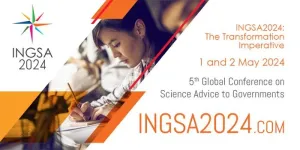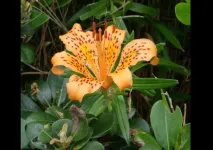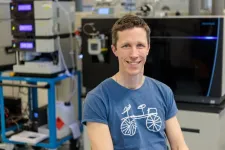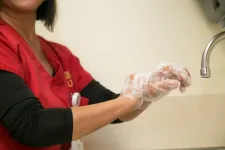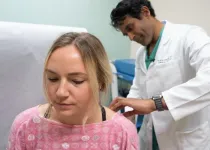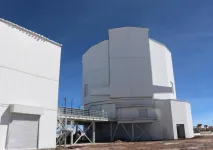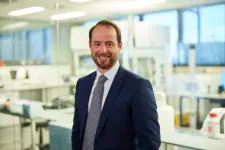Where? Kigali Convention Center, Rwanda: https://www.ingsa2024.com/
When? 1 – 2 May, 2024.
Context: One of the largest independent gatherings of thought- and practice-leaders in governmental science advice, research funding, multi-lateral institutions, academia, science communication and diplomacy is taking place in Kigali, Rwanda. Organised by Prof Rémi Quirion, Chief Scientist of Québec and President of the International Network for Governmental Science Advice (INGSA), speakers from 39 countries[1] from Brazil to Burkina Faso and from Ireland to Indonesia, plus over 300 delegates from 65 countries, will spotlight what is really at stake in the relationship between science, societies and policy-making, during times of crisis and routine.
From the air we breathe, the cars we drive, and the Artificial Intelligence we use, to the medical treatments or the vaccines we take, and the education we provide to children, this relationship, and the decisions it can influence, matter immensely. In our post-Covid, climate-shifted, and digitally-evolving world, the importance of robust knowledge in policy-making is more pronounced than ever. This imperative is accompanied by growing complexities that demand attention. INGSA’s two-day gathering strives to both examine and empower inclusion and diversity as keystones in how we approach all-things Science Advice and Science Diplomacy to meet these local-to-global challenges.
Held previously in Auckland 2014, Brussels 2016, Tokyo 2018 and Montréal 2021, Kigali 2024 organisers have made it a priority to involve more diverse speakers from developing countries and to broaden the thematic scope. Examining the complex interactions between scientists, public policy and diplomatic relations at local, national, regional and international levels, especially in times of crisis, the overarching theme is: “The Transformation Imperative”.
The main conference programme (see link below) will scrutinise everything from case-studies outlining STI funding tips, successes and failures in our advisory systems, plus regional to global initiatives to better connect them, to how digital technologies and A.I. are reshaping the profession itself.
INGSA2024 is also initiating and hosting a range of independent side-events that, in themselves, act as major meeting and rallying points that partners and attending delegates are encouraged to maximise. These include, amongst others, events organised by the Foreign Ministries Science & Technology Advice Network (FMSTAN); the International Public Policy Observatory Roundtable (IPPO); the High-Level Dialogue on the Future of Science Diplomacy (co-organised by the American Association for the Advancement of Science (AAAS), the European Commission, the Geneva Science & Diplomacy Anticipator (GESDA), and The Royal Society); the Organisation of Southern Cooperation (OSC) meeting on ‘Bridging Worlds of Knowledge – Promoting Endogenous Knowledge Development;’ the Science for Africa Foundation, University of Oxford Pandemic Sciences Institute’s meeting on ‘Translating Research Into Policy and Practice’; and the African Institute of Mathematical Sciences (AIMS) ‘World Build Simulation Training on Quantum Technology’ with INGSA and GESDA. INGSA will also host its own internal strategy Global Chapter & Division Meetings.
Prof Rémi Quirion, Conference Co-Chair, Chief Scientist of Québec and President of INGSA, has said that:
“For those of us who believe wholeheartedly in evidence and the integrity of science, recent years have been challenging. Mis- and disinformation can spread like a virus. So positive developments like our gathering here in Rwanda are even more critical. The importance of open science and access to data to better inform scientific integration and the collective action we now need, has never been more pressing. Our shared UN sustainable development goals play out at national and local levels. Cities and municipalities bear the brunt of climate change, but also can drive the solutions. I am excited to see and hear first-hand how the global south is increasingly at the forefront of these efforts, and to help catalyse new ways to support this. I have no doubt that INGSA’s efforts and the Kigali conference, which is co-led with the Rwandan Ministry of Education and the University of Rwanda, will act as a carrier-wave for greater engagement. I hope we will see new global collaborations and actions that will be remembered as having first taken root at INGSA2024”.
Hon. Gaspard Twagirayezu, Minister of Education of Rwanda has lent his support to the INGSA conference, saying:
“We are proud to see the INSGA conference come to Rwanda, as we are at a turning point in our management of longer-term challenges that affect us all. Issues that were considered marginal even five or ten years ago are today rightly seen as central to our social, environmental, and economic wellbeing. We are aware of how rapid scientific advances are generating enormous public interest, but we also must build the capabilities to absorb, generate and critically consider new knowledge and technologies. Overcoming current crisis and future challenges requires global coordination in science advice, and INGSA is well positioned to carry out this important work. It makes me particularly proud that INGSA’s Africa Chapter has chosen our capital Kigali as it’s pan-African base. Rwanda and Africa can benefit greatly from this collaboration.”
Ass. Prof. Didas Kayihura Muganga, Vice-Chancellor, University of Rwanda, stated:
“What this conference shows is that grass-roots citizens in Rwanda, across Africa and Worldwide can no longer be treated as simple statistics or passive bystanders. Citizens and communities are rightfully demanding greater transparency and accountability especially about science and technology. Ensuring, and demonstrating, that decisions are informed by robust evidence is an important step. But we must also ensure that the evidence is meaningful to our context and our population. Complex problems arise from a multiplicity of factors, so we need greater diversity of perspectives to help address them. This is what is changing before our very eyes. For some it is climate, biodiversity or energy supply that matters most, for others it remains access to basic education and public health. Regardless, all exemplify humanity’s interdependence.”
Daan du Toit, acting Director-General of the Department of Science & Innovation of the Government of South Africa and Programme Committee Member commented:
“INGSA has long helped build and elevate open and ongoing public and policy dialogue about the role of robust evidence in sound policy making. But now, the conversation is deepening to critically consider the scope and breadth of evidence, what evidence, whose evidence and who has access to the evidence? Operating on all continents, INGSA demonstrates the value of a well-networked community of emerging and experienced practitioners and academics working at the interfaces between science, societies and public policy. We were involved in its creation in Auckland in 2014, and have stayed close and applaud the decision to bring this 5th International Biennial Meeting to Africa. Learning from each other, we can help bring a wider variety of robust knowledge more centrally into policy-making. That is why in 2022 we supported a start-up initiative based in Pretoria called the Science Diplomacy Capital for Africa (SDCfA). The energy shown in the set-up of this meeting demonstrates our potential as Africans to do so much more together”.
INGSA-Africa’s Regional Chapter
INGSA2024 is very much ‘coming home’ and represents the first time that this biennial event is being co-hosted by a Regional Chapter. In February 2016, INGSA announced the creation of the INGSA-Africa Regional Chapter, which held its first workshop in Hermanus, South Africa. The Chapter has since made great strides in engaging francophone Africa, organising INGSA’s first French-language workshop in Dakar, Senegal in 2017 and a bi-lingual meeting as a side-event of the World Science Forum 2022, Cape Town. The Chapter’s decentralised virtual governance structure means that it embraces the continent, but new initiatives, like the Kigali Training Hub are set to become a pivotal player in the development of evidence-to-policy ecosystems across Africa.
Dr M. Oladoyin Odubanjo, Conference Co-Chair and Chair of INGSA-Africa, outlined that:
“As a public health physician and current Executive Secretary of the Nigerian Academy of Sciences (NAS), responsible for providing scientific advice to policy-makers, I have learnt that science and politics share common features. Both operate at the boundaries of knowledge and uncertainty, but they approach problems differently. Scientists question and challenge our assumptions, constantly searching for empiric evidence to determine the best options. In contrast, politicians are most often guided by the needs or demands of voters and constituencies, and by ideology. Our INGSA-Africa Chapter is working at the nexus of both communities and we encourage everybody to get involved. Hosting this conference in Kigali is like a shot in the arm that can only lead us on to even bigger and brighter things.”
Sir Peter Gluckman, President of the International Science Council, and founding chair of INGSA mentioned: “Good science advice is critical to decision making at any level from local to global. It helps decision makers understand the evidence for or against, and the implications of any choice they make. In that way science advice makes it more likely that decision makers will make better decisions. INGSA as the global capacity building platform has a critical role to play in ensuring the quality of science policy interface.”
Strength in numbers
What makes the 5th edition of this biennial event stand out is the perhaps the novel range of speakers from all continents working at the boundary between science, society and policy willing to make their voices heard. More information on Parallel Sessions organisers as well as speakers can be found on the website.
About INGSA
Founded in 2014 with regional chapters in Africa, Asia and Latin America and the Caribbean, and key partnerships in Europe and North America, INGSA has quicky established an important reputation as a collaborative platform for policy exchange, capacity building and operational research across diverse global science advisory organisations and national systems. INGSA is a free community of peer support and practice with over 6,000 members globally. Science communicators and members of the media are warmly welcomed to join for free.
Through workshops, conferences and a growing catalogue of tools and guidance, the network aims to enhance the global science-policy interface to improve the potential for evidence-informed policy formation at sub-national, national and transnational levels. INGSA operates as an affiliated body of the International Science Council. INGSA’s secretariat is based at the University of Auckland in New Zealand, while the office of the President is hosted at the Fonds de Recherche de Quebec in Montreal, which has also launched the Réseau francophone international en conseil scientifique (RFICS), which mandate is towards capacity reinforcement in science advice in the Francophonie.
INGSA2024 Sponsors
As always, INGSA organized a highly accessible and inclusive conference by not charging a registration fee. Philanthropic support from many sponsors made the conference possible. Special recognition is made to the Fonds de recherche du Québec, the Rwanda Ministry of Education as well as the University of Rwanda. The full list of donors is available on the INGSA2024 website (link below).
[1] Australia, Belgium, Brazil, Cameroon, Canada, Chile, China, Costa Rica, Cote d’Ivoire, Denmark, Egypt, Ethiopia, Finland, France, Germany, Ghana, India, Ireland, Italy, Jamaica, Japan, Kenya, Lebanon, Malawi, Malaysia, Mauritius, Mexico, New Zealand, Nigeria, Portugal, Rwanda, Saudi Arabia, South Africa, Spain, Sri Lanka, Uganda, UK, USA, Zimbabwe
END
